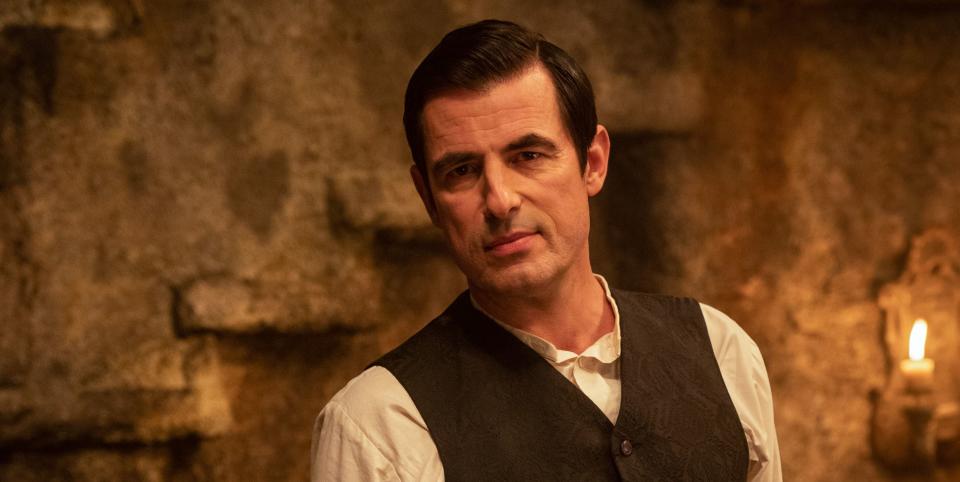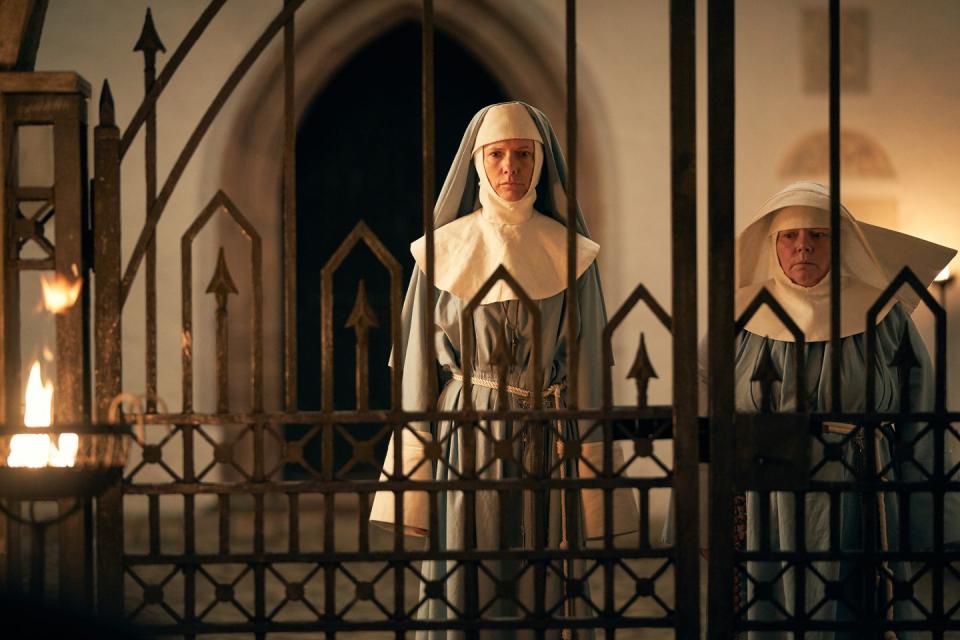BBC Dracula's Sister Agatha is a huge and successful change to the book

BBC's new version of Dracula has been a bloody huge success, towering over previous adaptations like a suspiciously creepy castle in Transylvania — and much of that is down to all the changes made to the original text.
After watching COUNTless versions of Bram Stoker’s original novel from 1897, it's refreshing to see writers Mark Gatiss and Steven Moffat rip the book apart with a ferocity usually reserved for Dracula himself.
Along with that accent, all those camp one-liners and the addition of a not-so-cute vampire baby, BBC's Dracula has made one particularly big change to the book that's already divided fans online.
In Stoker's novel, the character of Sister Agatha was a thankless role, but here, Gattis and Moffat have transformed the Nun into a central figure whose deadpan commentary steals every scene. And that's not easy on a show where naked men emerge from corpses made out of melted sex toys.
Not since Sister Act have we met a Nun this sassy, and that wasn't the only twist hiding behind that habit either.
I’m all your nightmares at once, I’m an intelligent woman with a crucifix
Sister Agatha is 2020’s first heroine #Dracula pic.twitter.com/s1lM2FIGwr— Alistair Canlin (@alcanlin) January 1, 2020
Towards the end of the first episode, Dracula arrives outside the convent gates and discerns Agatha's true identity by tasting her blood. Not only is she a sister of God, but she's also related to the infamous Van Helsing too.
The original Van Helsing was an elderly Dutch scientist who fought Dracula, and in the years that followed, the character has evolved into a professional vampire hunter in multiple shows and movies.
There was even a female Van Helsing in the SyFy series of the same name, but never before has a Van Helsing looked quite like this.

Actress Dolly Wells brings a compelling mix of gravitas and camp to the role, winning over a huge congregation of fans on social media. Unfortunately, that hasn't stopped a few trolls from biting back at this character's radical reinvention.
Most of the complaints suggest that Dracula should remain more faithful to the book or that the BBC are pandering to modern gender politics, but Moffat revealed to the Radio Times that Agatha's evolution was part of a natural storytelling process:
"We were trying to work out how to write these scenes and make them interesting – because you know, it’s a dead man talking to a nun, it’s not potentially that riveting. So we came up with the idea of atheist nun – we just called her atheist nun, the nun who didn’t really believe in anything and just made lots of jokes."
"That character immediately leapt to the top of the script... And very, very quickly we just thought well… that’s Van Helsing, isn’t it? We don’t need anyone else. We just need the nun. And then you think, nuns are more or less dressed in a superhero outfit for fighting vampires, aren’t they? They’re wearing a sodding cross! Why didn’t Bram think of that one?"
For the most part, Bram didn't think much of his female characters at all. While Mina does possess some agency of her own, most of the other women in his novel are seen as lesser, particularly when it comes to the Three Sisters who obey Dracula's every command.
Of course, much has changed since 1897, and that's true of how people have interpreted Stoker's book as well.
Since Nosferatu took some liberties with the text way back in 1922, different generations have sunk their teeth into different forms of symbolism and representation within the book that reflects their own political climate.
"Like many women my age I'm trapped in a loveless marriage, maintaing appearances in order to keep a roof over my head" We stan Sister Agatha #Dracula
— James Shaddock (@jpshaddock) January 1, 2020
Second-wave feminists in the 1970s argued that Dracula is drenched in misogyny, which in turn led to reactionary sexploitation films like Vampire Hookers (1978). Later readings theorised that the relationship between Jonathan Harker and Dracula is intrinsically queer, and that's something the BBC's version has fed into as well.
One common thread throughout all these numerous adaptations is that women are rarely portrayed as anything more than mere victims, which is why this new take on the Van Helsing mythos works so well.
The BBC made a similar change to another Victorian classic recently when Eleanor Tomlinson's character was expanded in their new War of the Worlds adaptation. Detractors attacked this too, masking their misogyny with claims that the classics shouldn't be tampered with.
However, in a world with countless adaptations of Dracula and War of the Worlds, it's about time that viewers were offered something new — and it's about time that women took the lead in modern versions of these stories too.
Sadly, it's rather telling that those aforementioned trolls seem to be more scared of a powerful woman than Dracula himself. It's like Agatha herself says: "I’m all your nightmares at once. I’m an intelligent woman with a crucifix."
Dracula continues tonight (January 2) at 9pm on BBC One.
Digital Spy now has a newsletter – sign up to get it sent straight to your inbox.
Want up-to-the-minute entertainment news and features? Just hit 'Like' on our Digital Spy Facebook page and 'Follow' on our @digitalspy Instagram and Twitter accounts.
You Might Also Like

 Yahoo News
Yahoo News 